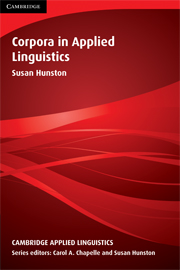Book contents
- Frontmatter
- Contents
- Series editors' preface
- Acknowledgements
- 1 Introduction to a corpus in use
- 2 The corpus as object: Design and purpose
- 3 Methods in corpus linguistics: Interpreting concordance lines
- 4 Methods in corpus linguistics: Beyond the concordance line
- 5 Applications of corpora in applied linguistics
- 6 Corpora and language teaching: Issues of language description
- 7 Corpora and language teaching: General applications
- 8 Corpora and language teaching: Specific applications
- 9 An applied linguist looks at corpora
- List of relevant web-sites
- References
- Index
8 - Corpora and language teaching: Specific applications
Published online by Cambridge University Press: 05 October 2012
- Frontmatter
- Contents
- Series editors' preface
- Acknowledgements
- 1 Introduction to a corpus in use
- 2 The corpus as object: Design and purpose
- 3 Methods in corpus linguistics: Interpreting concordance lines
- 4 Methods in corpus linguistics: Beyond the concordance line
- 5 Applications of corpora in applied linguistics
- 6 Corpora and language teaching: Issues of language description
- 7 Corpora and language teaching: General applications
- 8 Corpora and language teaching: Specific applications
- 9 An applied linguist looks at corpora
- List of relevant web-sites
- References
- Index
Summary
This chapter looks at two specific applications of corpora: to English for academic purposes (EAP) and language testing, and at the specific area of learner corpora.
Corpora and EAP
For the teacher of English for academic purposes, the issue of ‘what to teach’ (as opposed to ‘how to teach’) is of particular significance. If a student is required to write an essay, a thesis, or an academic paper, what are the salient features of those genres that the student needs to be aware of? One answer to this question is to be found in the work of genre analysts (e.g. Swales 1990; Bhatia 1993). Further information can come from corpus linguistics. Some of the most interesting work in this area focuses on very specific kinds of writing, such as academic papers in individual disciplines.
In looking at some of the work in this area, I shall borrow Halliday's notions of the ideational and the interpersonal. Some corpus studies of the documents in academic disciplines focus on the typical phraseologies of these disciplines, and this leads them to a discussion of the ideational meanings made (e.g. Gledhill 1995; 1996; Luzon Marco 2000). Other studies focus on an interpersonal meaning (e.g. Hyland 1998; Charles in preparation), and compare disciplines to see how this meaning is made. Thus the two approaches, whether intentionally or not, highlight different kinds of variables in the discourse construction of a discipline.
- Type
- Chapter
- Information
- Corpora in Applied Linguistics , pp. 198 - 212Publisher: Cambridge University PressPrint publication year: 2002



